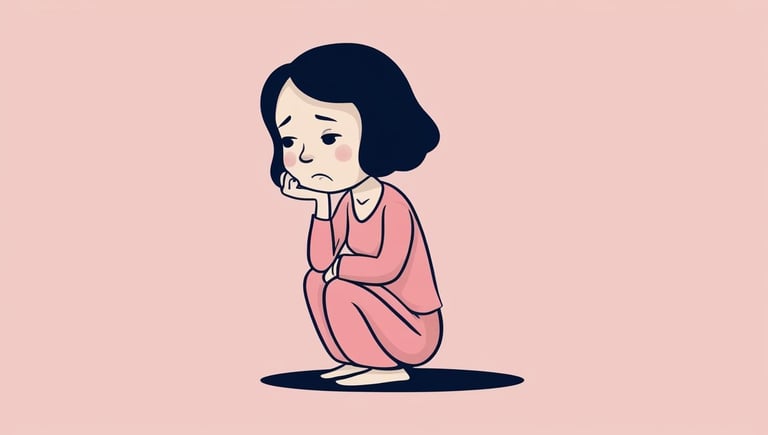Understand and Overcome Low Self-Esteem
In my private practice, I often discuss self-esteem with clients. It’s interesting how many people either feel like they’ve struggled with confidence for most of their lives or find it particularly challenging during major life changes. Low self-esteem is something a lot of us deal with at some point. In this blog, I want to chat about what causes low self-esteem, how it affects us, and some practical tips to help boost it. Let’s dive in!
Clara Dawson
3/14/20255 min read
What is Low Self-Esteem?
Low self-esteem means you feel you are not valuable, have a low self-worth and have a negative view of yourself. This can lead to feeling inadequate, doubting yourself, and lacking confidence. Having low self-esteem can affect various parts of our lives, like our relationships, work, and personal goals. It might make us shy away from certain situations, find it tougher to make decisions, and sometimes even hold us back from reaching our dreams. Self-esteem and confidence are different; confidence is a belief in your own abilities and skills. Self-esteem is how much you appreciate yourself and your own self-worth.
What Causes Low Self-Esteem?
Low self-esteem doesn’t just appear out of nowhere—it’s often shaped by past experiences and the way we see ourselves in the world. Here are some common reasons why you might be struggling with self-worth:
💬 Childhood Experiences – The way we’re treated as children can leave a lasting impact. If you faced a lot of criticism, neglect, or even overprotection, you might have learned to doubt yourself. Unresolved trauma can also play a big role in shaping how you feel about your worth.
📱 Constant Comparisons – Ever find yourself scrolling through social media and feeling like you don’t measure up? It’s easy to compare your behind-the-scenes to someone else’s highlight reel, leading to feelings of not being "good enough."
🎯 Perfectionism – Setting impossibly high standards for yourself can be exhausting. When you expect perfection, even small mistakes can make you feel like a failure—when in reality, no one gets it right 100% of the time!
❌ Past Failures and Criticism – If you've faced repeated setbacks or harsh feedback, it can wear down your confidence over time. Instead of seeing failures as learning experiences, they may start to feel like proof that you're not capable or worthy.
🧠 Mental Health Struggles – Anxiety and depression can be both a cause and a result of low self-esteem. They can make it harder to challenge negative thoughts about yourself, keeping you stuck in a cycle of self-doubt
Low Self-Esteem Affects Your Life
Low self-esteem doesn’t just impact how you see yourself—it can ripple into different areas of your life, sometimes in ways you don’t even realise. Here’s how it might be showing up:
❤️ Relationships – Do you struggle to set boundaries or fear rejection? Low self-esteem can make it hard to speak up for your needs, leading to one-sided or even unhealthy relationships. You might stay in situations that don’t serve you simply because you don’t feel worthy of better.
🧠 Mental & Physical Health – When your self-worth is low, stress and anxiety can take over. This emotional toll can even show up physically—tension headaches, fatigue, or trouble sleeping can all be linked to ongoing self-doubt.
🚀 Career & Ambitions – Ever held back from applying for a job or speaking up in a meeting because you didn’t think you were “good enough”? Low self-esteem can make you second-guess yourself, stopping you from reaching your full potential.
💆♀️ Self-Care & Happiness – When you don’t value yourself, it’s easy to neglect your needs. You might put others first all the time, ignore your own well-being, or feel like you don’t "deserve" happiness. But you do! Prioritising yourself isn’t selfish—it’s essential.
Steps to Build Your Self-Esteem
Overcoming low self-esteem takes time, but with small, intentional steps, you can start to shift how you see yourself. Here’s how to begin:
🧐 Step 1: Build Awareness & Self-Reflection
Before you can change how you feel about yourself, you need to understand where those negative thoughts come from. Do you constantly doubt yourself? Do certain situations trigger feelings of not being “good enough”?
📖 Try This: Start journaling your thoughts or talking to a therapist. Writing things down can help you spot patterns in your self-talk. Therapy can guide you in breaking free from old, unhelpful beliefs.
🧠 Step 2: Challenge Negative Thoughts
That little voice in your head that tells you you’re not good enough? It’s not always telling the truth. Many of these thoughts are just old patterns that need rewiring.
💡 Try This: Use Cognitive Behavioural Therapy (CBT) techniques to challenge those thoughts. When you catch yourself thinking something harsh, ask yourself: Is this really true? Would I say this to a friend? Replace self-criticism with a more balanced, realistic view.
💙 Step 3: Practice Self-Compassion
You wouldn’t think negatively about a friend for making a simple mistake, so why do it to yourself? Self-compassion means treating yourself with kindness, even when things don’t go perfectly.
🌱 Try This: When you catch yourself being self-critical, pause and reframe it. Instead of saying, I’m such a failure, try, I made a mistake, but that doesn’t define me. Accepting your imperfections is part of growing.
🏆 Step 4: Set Realistic Goals & Celebrate Wins
Confidence comes from taking action, not just thinking positively. Set small, realistic goals, and celebrate even the little victories—because they all add up.
🎯 Try This: Break big tasks into smaller steps and acknowledge your progress. Whether it’s speaking up in a meeting or simply getting through a tough day, every step forward is worth recognising.
🌟 Step 5: Surround Yourself with Positive Influences
The people around you can either lift you up or drag you down. If you’re constantly surrounded by negativity, it’s harder to build self-worth.
🔄 Try This: Take note of who makes you feel good about yourself and who doesn’t. Limit time with those who bring you down and seek out relationships that encourage and support you.
💆♀️ Step 6: Prioritise Self-Care
Taking care of yourself isn’t selfish—it’s necessary. When you feel good physically and mentally, it’s easier to believe in your own worth.
🛀 Try This: Make self-care a habit. Whether it’s getting enough sleep, eating well, exercising, or practising mindfulness, these small acts send a message to yourself that you are worthy of care.
🤝 Step 7: Seek Professional Support
Healing isn’t something you have to do alone. Speaking to a therapist or joining a support group can give you the guidance and tools you need to rebuild your self-esteem.
💬 Try This: If you’re struggling, reaching out for professional support is a sign of strength, not weakness. It’s okay to ask for help—everyone deserves support on their journey to self-worth.
Conclusion: You Deserve to Feel Good About Yourself
Struggling with low self-esteem can feel overwhelming, but it’s not a life sentence. With self-awareness, support, and patience, you can start seeing yourself in a kinder, more compassionate way. Remember, change doesn’t happen overnight—it’s about taking small, steady steps toward believing in your own worth.
🌱 Be gentle with yourself. Every little effort you make to challenge negative thoughts, set boundaries, or practice self-care is a step in the right direction. You don’t have to have it all figured out—just keep moving forward.
💛 You are worthy of love, respect, and happiness. Not because you’re perfect, but because you’re human.
Ready to Start Your Healing Journey?
I’m here to help, let’s connect:
clara@wild-deer-therapy.com or
WhatsApp me on 07421503393




